
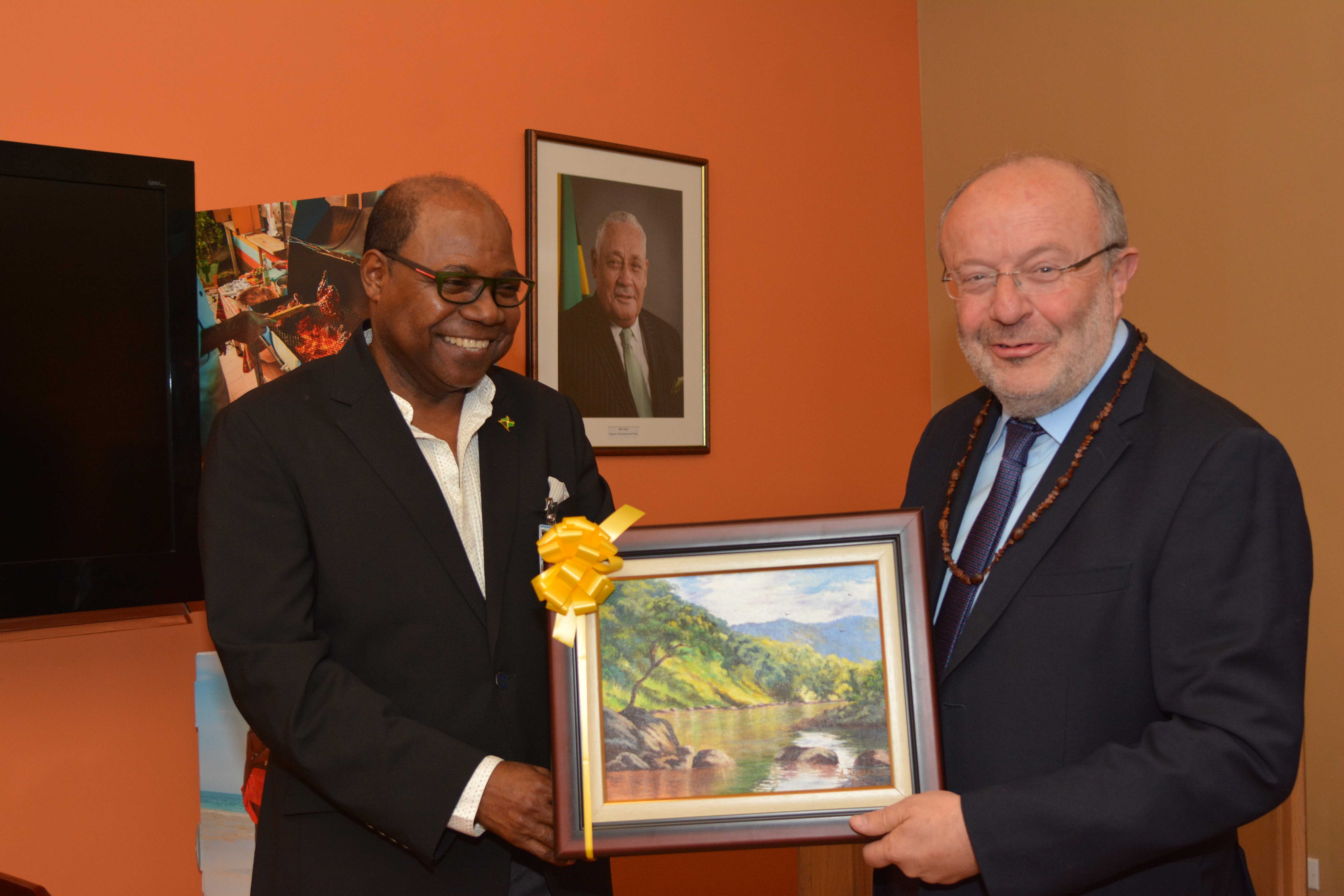
Bartlett Wants More From Tourist Dollar
MONTEGO BAY, Jamaica, Tuesday, July 11, 2017: With investment in room stock surging ahead of set targets, Minister of Tourism Hon Edmund Bartlett is turning attention to finding ways of retaining more of the tourist dollar in Jamaica.’
“What we want now is capacity building. We want investment in supplying the inputs of tourism; more agriculture, more manufacturing and more experiences with investment in entertainment, in the arts, gastronomy and culture,” said Minister Bartlett Sunday (July 9) at a press briefing at Sangster International Airport to welcome Evelop Airlines out of Madrid, Spain. “That’s the kind of investment I’m looking for from now on because we have enough takers for the 20,000 additional rooms that we want,” he added.
He was speaking against the background of Evelop adding some 8,000 seats to airlift out of Madrid to Montego Bay for the summer. A special guest on board Sunday’s flight with 328 passengers and crew was Spain’s Secretary of State for International Cooperation for Latin America and the Caribbean, Mr. Fernando García Casas, who was welcomed by a party of officials headed by Minister Bartlett and including Spanish Ambassador to Jamaica, His Excellency Josep Maria Bosch.
Spanish investment now accounts for some 10,000 hotel rooms and counting. Also, by the last quarter of this year, ground should be broken in Duncans, Trelawny, for a 750-room development by H10 Hotels out of Barcelona. About that time too, ground will be broken for 100 rooms at Rose Hall, Montego Bay. Minister Bartlett said this was in addition to the 750 rooms being built in Falmouth by Excellence Resorts.
He stressed, however, “We don’t want to be just building more and more rooms. We want to be building the capacity of the people of Jamaica to start to convert that wealth that comes here on the plane and in the ship into dollars in their pockets.”
In looking to Spain for some guidance, Minister Bartlett said he had discussed with the Secretary of State and the Ambassador the fact that tourism was responsible for the fast turnaround of Spain’s economy after the recession; defying the belief by many that because of its tourism-based economy the country would not rebound as the last thing people would do is travel. However, this belief proved to be wrong as travel was stepped up.
Minister Bartlett said this underlined the fact that tourism was not as fragile as it was made out to be but that “it represents a very sound, sustainable way of driving growth in an economy.” With the Spanish economy having bounced back, the tourist traffic had begun to move again “so we are in a position where we can leverage that to bring a direct flight to Jamaica,” said Minister Bartlett.
The Evelop rotation goes up to October but the tourism minister is optimistic that it will set the stage for scheduled flights to come.
Ambassador Bosch said the decision by Secretary of State Fernando Casas to start his visit to Jamaica in Montego Bay “is very important and marks the importance that we give as the Spanish government to tourism and on the Spanish investment in the hotel industry in Jamaica.”
He said while Spain had other interests in Jamaica, tourism was the basis on which a closer relationship would be built between the two countries.
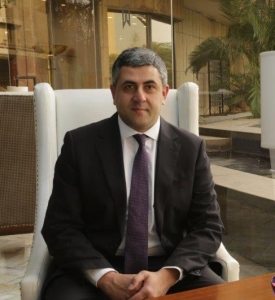
Why wait for the UNWTO General Assembly? New Secretary General positioning
Some may see it as a promising move, others are upset and concerned. The nominated but unconfirmed UNWTO Secretary General Zurab Pololikashvili has been receiving privileges only a confirmed nominee is expected to get.
It’s the most talked about and some say the most contested nomination by an UNWTO Executive Committee. Some leaders of the global travel and tourism industry and governments have shown serious doubts for the next UNWTO General Assembly to confirm the recommendation by the Executive Council.
This confirmation is needed for the nominee Ambassador Zurab Pololikashvili to officially become Secretary-General of the United Nations World Tourism Organization. This process will take place during the full UNWTO General Assembly in Chengdu, China in September 2017. Once confirmed the term will start January 1, 2018
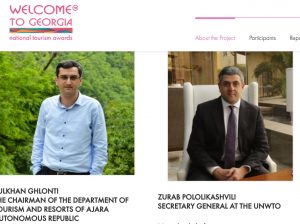
The time after a possible confirmation from September to the end of the year could easily be used for the current Secretary General to show the Secretary General-Elect how the system works. According to information received by eTN, this process has already started.
Mr. Pololikasvili attended two top level management discussions in Madrid, usually only open to the Secretary General and his close inner circle and directors. After all, this may not be and cannot be seen as a malicious move by the current SG Taleb Rifai. Mr. Pololikasvili has been seen having little or no experience and may need all the training he can get.
“Secretary General UNWTO” is the title ambassador Pololikashvili published for himself on awards-tourism.com. The awards are known as the “Oscar” for Georgian tourism recognition. The National Tourism Awards proudly appointed Zurab also as a juror and named him “Secretary General of UNWTO.”
This cannot just be an innocent mistake, but it’s understanding people in Georgia are excited and proud to have one of their own to possibly become the leader of the global tourism world.
The awards enjoy big support from the Georgian government and from the private sector. National Tourism Administration of Georgia is a co-organizer of this project, The Ministry of Economics and Sustainable Development of Georgia and Tbilisi City Hall are Official Supporters. The Awards Ceremony is an opportunity to bring together national and local authorities, hotels, restaurants, tour operators, travel agencies, wine companies and more.
Another surprise move was for Pololikashvili to meet the Bulgarian Tourism Minister Angelkova and discussed issues only relevant to UNWTO and not anything only relevant for bilateral issues between Georgia and Bulgaria.
A report in the Bulgarian media said: “The Bulgarian Tourism Minister Angelkova met with UNWTO Secretary-General Nominee Pololikashvili held a working meeting in Belgrad at a Conference on Sustainable Tourism in the Danube Region.”
“The two considered the opportunities for cooperation between the Ministry of Tourism and the UNWTO, as well as future joint initiatives for sustainable development of the sector. Angelkova familiarized Pololikashvili with the steps taken by Bulgaria for sustainable development of tourism and assured him that the country will continue to be one of the most active UNWTO members.”
The Bulgarian minister told journalist at a press conference Bulgaria had supported the Georgian candidate with their vote. Bulgaria is a member of the UNWTO Executive Council.
Some think there may be nothing wrong for Zurab to meet Angelkova in regards to UNWO, but not announcing it, not facing the media could be relating a different message. Before and after his nomination in Madrid, the ambassador had been very quiet. Answering questions or laying out plans has not been his strength.
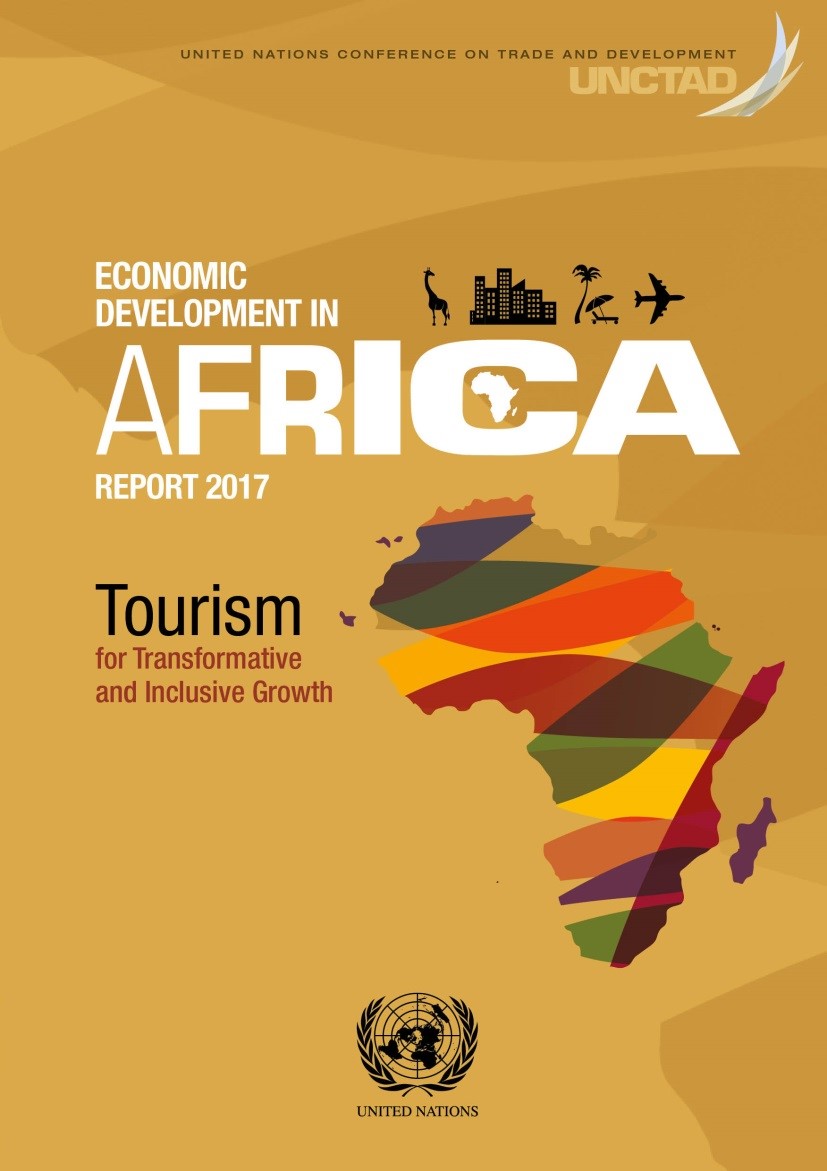
Dr. Walter Mzembi launches UNCTAD Economic Development in Africa Report 2017 on ‘Tourism for Transformative and Inclusive Growth’
06 July 2017, Mikel’s Hotel, Harare, Zimbabwe
The Officer in Charge – United Nations Information Centre, Ms. Tafadzwa Mwale;
The Director of Knowledge and Learning – African Capacity Building Foundation (ACBF), Dr. Thomas Chataghalala Munthali;
Members of Diplomatic Corps;
UN Agencies here represented;
All Dignitaries and Fellow Citizens
Tourism is the engine for not only Transformative Growth and Inclusive Growth in Africa, but the centre – piece for accelerated broad based empowerment of women and youth. The African Union adopted Agenda 2063, and in 2017, the AU adopted the theme: Harnessing the Demographic Dividend – which to me can succeed effectively if Africa exploits the inert potential in tourism.
Tourism worldwide is in the export category. It ranks third, behind only fuel and chemicals, and ahead of food products and automotive industry. In many developing countries such as Rwanda, tourism is the top export sector. It contributes 10% to Global GDP, generates 1.5 trillion USD in export earnings, employs 1 in every 11 globally, it accounts for 30% of total exports in services and it is 7% in quantum for all global trade. The sector has experience exponential growth from 25 Million international arrivals in 1950 to 1.2 Billion international arrivals in 2016.
Going forward to 2030 aligned to the SDGs timelines, the sector is signposting 1.8 Billion. However, we are likely to revise these figures on the back of fast growth of the Chinese outbound tourism market. The Chinese Premier last year cautioned us to prepare to receive 600 million Chinese tourists by 2020 globally from the projected growth of 200 million. China is currently the bulwark of outbound tourism with its ever growing middle class of over 300 million – and if anything, the projected 1.8 Billion international arrivals by 2030 could be an understatement of the reality of this sector’s growth potential. What it means – is Africa should prepare itself to receive the world.
In its wisdom, on the 4th of December 2016, the United Nations declared 2017 the International Year of Sustainable Tourism for Development. Thus, the launch of this report gives me more hope as it resonates with our celebration of 2017 the International Year of Sustainable Tourism for Development. In my campaign for post of Secretary General of the United Nations World Tourism Organisation, the results of which are all known to us, and I am happy to share with you that we missed the opportunity to lead the UNWTO by falling short of a mere two votes to Georgia. In my Statement of Policy Intent and Management – I emphasized in no particular order:
• Relevance of the organisation to its members, especially growing the tourism economy with equity across all regions.
• Reinstituting the Agency’s developmental mandate – and setting up a Global Tourism Fund being top priority to me.
• Universality: – which primarily focused on growing the membership of the organization – and align it to the 193 UN Members as opposed to the current 157 that are members of the UNWTO, and further to that bring on board countries such as the U.S.A, Britain, Australia and Canada that are currently outside the UNWTO, and to grow both Affiliate and Associate Membership, incorporating cities which are now important competitive sub-brands of tourism.
• Create more relevance of the Agency.
• Make UNWTO more inclusive – in dealing with global challenges together with other agencies e. g. dealing with issues related and not limited to Tourism and Security, Redefine insecurities to include natural disasters, Climate Change, Biodiversity terrorism on both terrestrial and marine resources, migration, travel advisories and travel bans, disasters and post disaster management and destination restorations etc.
• Make the UWTO more responsive: – Answer to membership expectations, respond expeditiously and practically to issues besetting the tourism sector. At the same time, motivate members’ active participation in global tourism policy formulation with inclusivity.
• Diplomacy – Use tourism as a tool for diplomacy in keeping with leveraging tourism to build cultural understanding across the globe and strengthen peace and co-existence among people and nations.
• Permanent representation: – meant to enhance the Agency’s international political recognition.
The race for the post will only be over once the UNWTO Secretary General Elect gets the required 2/3 confirmatory votes in September 2017, 22nd Session of the UNWTO General Assembly in Chengdu, the People’s Republic of China.
In the context of SDGs, we were assigned Sustainable Development Goals 8, 12 and 14.
Goal 8: Promote sustained, inclusive and sustainable economic growth, full and productive employment and decent work for all;
Goal 12: Ensure sustainable consumption and production (SCP) patterns; and
Goal 14: Conserve and sustainably use of the oceans, seas and marine resources for sustainable development, while having a multiplier effect on many other Goals.
This new development agenda to 2030 is the most ambitious to date, and embedded in all the 17 SGDs, are clear efforts that consign us to work towards poverty eradication, ensure sustainability, protect the planet, and ensure equality and prosperity for all.
The relationship between tourism and sustainability, inclusive growth with attendant transformative characteristics is underpinned by embracing new technology and innovation, ensuring seamless travel and security, and robust travel facilitation. Africa’s growth of all the glorious statistics I shared with you is a mere 3-5% of the global total of 1.2 Billion arrivals. Thus, the continent is the weakest link and we need to work hard to change the situation.
There is no doubt that tourism is a powerful vehicle for promoting and reaching development milestones, and I am pleased to note that Africa has huge potential if exploited to enhance tourism’s contribution to the economic, environmental and social dimensions of sustainability. Tourism contributes directly to employment creation, and this can be a solution to the problem of our young man and women having to risk their lives crossing the Mediterranean Sea and Island of Lampedusa going to Europe to look for similar jobs that can be created within Africa through investment in tourism, and retain our youth in the continent to contribute to productive work.
Africa has had its fair share of challenges chief among them: Diverse and prohibitive Visa Regimes; Destination Accessibility challenges; Continental Brand Hygienic issues; Insecurities; and Funding for competitive infrastructure development – so critical to connect destinations to markets and capital (connectography) in order to ensure a successful tourism economy.
To achieve sustainability and success of the tourism sector in Africa, we are ceased under the AU Agenda 2063 with the consummation of a continental tourism policy and institutionalisation, dealing with Brand Africa, Liberalisation of the airspace through the implementation of the 1998 Yamoussoukro Declaration. We are also implementing Universal Visa Systems (UNIVISA), building more hotels, airports and resorts in order to improve tourism business and trade in Africa.
At the same time, we are ceased with sustainable management and conservation of both marine and terrestrial natural resources. According to the UNWTO Study on ‘Towards Measuring the Economic Value of Wildlife Watching Tourism in Africa’ nature related activities accounts for over 80% of Africa’s product offering and attraction. Thus, we are conscious of sustainable management of our natural resources to remain relevant and competitive as a continent. More importantly, we are also paying attention to matters related to tourism and security so that we guarantee safety and peace to our visitors. In my view, tourism essentially serves the planet as well as people – thus we are conscious on our sector to alert to climate change issues, mitigation and adaptation of the sector to avoid the risks that can degrade our product offering and competitiveness.
The Report shared to us today by the United Nations Conference on Trade and Development (UNCTAD) regarding Economic Development in Africa 2017 with the primary focus on ‘Tourism for Transformative and Inclusive Growth’, resonates with our various efforts at both national and international levels as we seek to maximise this sector’s potential to sustainable development. The results show great potential – a source of hope to all of us. At the same time, it identifies gaps – which in themselves represent strong cases needing attention from both the public and private sector to work as a collective in addressing these challenges.
Ladies and Gentleman, it is my singular honour and privilege, to declare the UNCTAD Economic Development in Africa Report 2017, Tourism for Transformative and Inclusive Growth launched.
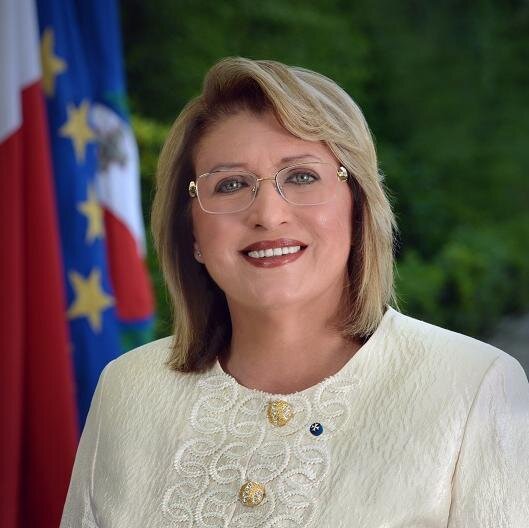
UNWTO appoints President of Malta as Special Ambassador of International Year of Sustainable Tourism for Development
Marie Louise Coleiro Preca, President of the Republic of Malta, has been nominated as Special Ambassador of the International Year of Sustainable Tourism for Development. The appointment took place at a ceremony held at the World Tourism Organization (UNWTO) Headquarters in Madrid.
The President of Malta, Marie Louise Coleiro Preca, underlined in her intervention the relevance of sustainable tourism as a means to build peace, social cohesion, and prosperity for all of humanity.
Cultural diplomacy, peace building and understanding were some of the components of sustainable tourism highlighted by the President of Malta. “Tourism shows us that positive experiences in new destinations can transform people’s perceptions, and give them a new understanding of different cultures,” she said.
“Tourism has the power to make us aware of our enriching diversity. In an increasingly globalized world, tourism provides opportunities for social solidarity, community empowerment, and potential peace building,” she added.
“When designating 2017 as the International Year of Sustainable Tourism for Development, the UN recognized tourism’s contribution to people and planet; to peace and prosperity. The Mediterranean is a melting pot of civilizations; a testimony of our origins and an inspiration for our future and having the President of Malta as a contributor to the International Year is a privilege,” said UNWTO Secretary-General Taleb Rifai.
The event served also to introduce the Mediterranean Tourism Foundation, of which the President of Malta is a Patron. Established in 2013, the Foundation aims at increasing the potential for sustainable tourism growth across the Mediterranean and to transform the Mediterranean into an area of peace, cooperation and prosperity by investing and promoting sustainable tourism.
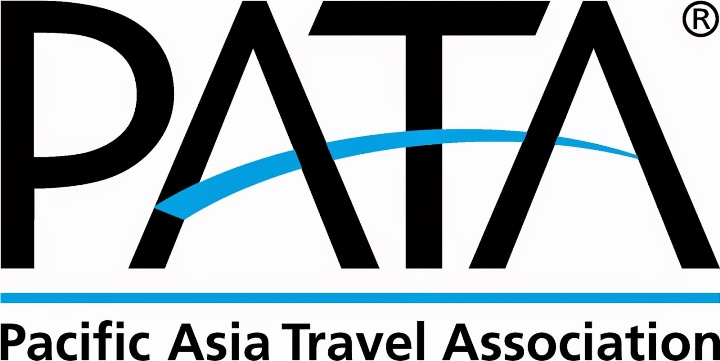
PATA maintains leadership in sustainability practices
BANGKOK, July 4, 2017 – PATA’s Bangkok headquarters has retained its EarthCheck Silver-level Sustainability Certification for a second consecutive year.
The Pacific Asia Travel Association (PATA) head office team worked with guidance from EarthCheck, a leading scientific benchmarking, certification and advisory group for the travel and tourism industry, in the collection and collation of relevant operational data on daily practices in order to be benchmarked against EarthCheck’s global sustainability standard.
The PATA head office received Bronze Benchmarked Sustainability Certification in 2015 and the Silver Certification was first awarded during the Association’s Annual Summit in Guam in May 2016. The EarthCheck benchmarking data embraces water and energy consumption, waste management, community contributions/activities and risk management as well as the use of paper and cleaning products.
PATA CEO Dr. Mario Hardy said, “Our head office in Bangkok has demonstrated impressive teamwork and applied a number of thoughtful initiatives in order to maintain Silver-level status. Year by year we are becoming more sustainable and environmentally friendly when we carry out our daily duties. I hope that our actions and achievements may continue to inspire our members to pursue sustainable and responsible business practices.”
Stewart Moore, CEO and founder of EarthCheck, stated that the Pacific Asia Travel Association continues to provide important leadership. “PATA was the first administration office in Thailand to achieve this hard-earned and coveted recognition and is also the first to maintain this status. In doing so, PATA is encouraging its neighbours and peers to consider their social and environmental impacts that may, inevitably, provide economic and social benefits.”
EarthCheck Certified is built upon the belief that effective scientific benchmarking puts rigour and transparency into business processes, benefitting all stakeholders in the long term. According to the programme’s protocols, members must achieve Silver for five (5) consecutive years before seeking Gold Status.
“PATA is committed to treading lightly on the planet and has, for many years, taken steps to reduce its environmental impact. The Association aims to inspire its members to act in the interests of society at large, protecting the very reason that we all love to travel. PATA encourages its stakeholders to promote its commitment to sustainability and social responsibility in the travel and tourism sector and in their daily lives,” added Dr. Hardy. “We must stretch our sustainability horizons in order to protect our planet for future generations.”
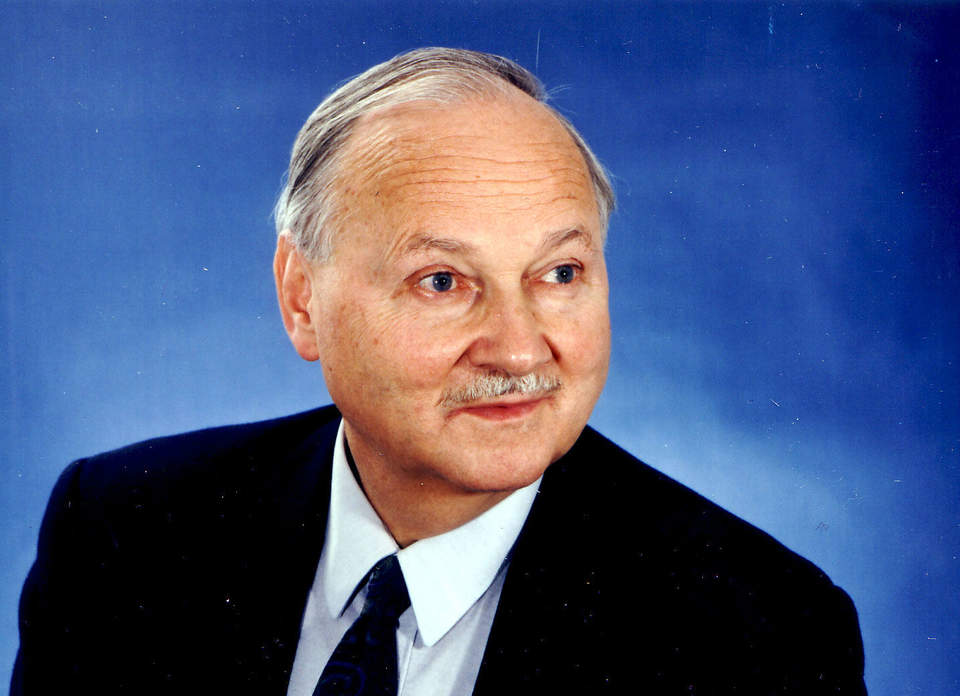
Introduced on Canada Day and for world tourism: The Maurice Strong Legacy Scholarships
Today is Canada Day. It’s also a day to remember the late Maurice Strong a Canadian Hero, a Travel & Tourism Veteran, who led many historical sustainable development initiatives, including the 1992 Rio Earth Summit and its Agenda 21 implementation framework.
Professor Geoffrey Lipman, a tourism personality on its own, co founder and president of the Hawaii, Brussels, Seychelles and Bali based International Coalition of Tourism Partners (ICTP ) =link to http://ictp.travel= and head of SUN x program introduced SUN x – the Strong Universal Network as being inspired by his friend and mentor, the late Maurice Strong, who led many historical sustainable development initiatives, including the 1992 Rio Earth Summit and its Agenda 21 implementation framework. Maurice collaborated with us for 20 years on Green Growth & Travelism issues. He knew climate change was eXistential for humanity, without a massive global response.
To continue his vision, we have created The Maurice Strong Legacy Scholarship Program. Each year, with our University partners, we will invite students – undergraduate and post graduate – to submit a 2,000-word essay on Impact-Travel -measured, green and 2050 climate resilient.
We will publish the top ten – each of which will receive a scholarship of $3000
For each published essay, we will enroll 20 “best efforts” as lifetime SUNx Members with access to our curated information on climate resilience and Impact-Travel, with an open invitation to our annual RefleXions event.
Sun Co-Founder, and President of ICTP, Professor Geoffrey Lipman said “We believe this growing network of smart young people, committed to advancing the case for climate resilience through Impact-Travel, will do much to keep Maurice Strong’s vision alive – and more importantly to build a responsive leadership cadre within the sector. It will link to the evolving Paris Accord implementation program and related SDGs. Maurice would have liked that.”
We are announcing the MSL Scholarship Program on Canada Day 2017 in honor of a great Canadian Internationalist.
We will provide 10 sponsored Scholarships this year and have a goal of 150, to celebrate Canada’s birthday. And looking for partners – public, private, and civil society – who share our vision of creating a movement within the travel and tourism sector, committed to developing climate resilience from the ground up.
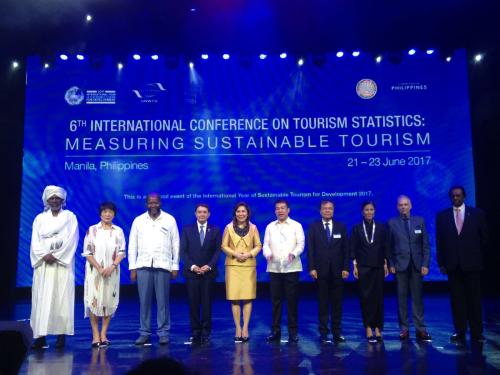
UNWTO Manila Conference sets roadmap to measure Sustainable Tourism
Nearly 1.000 experts from over 80 countries convened for three days (21-23 June) in Manila, The Philippines at the 6th International Conference on Tourism Statistics to lay the groundwork for an expanded statistical framework to measure sustainable tourism in its economic, social and environmental dimensions. The outcome ‘Call for Action on Measuring Sustainable Tourism’ represents a global commitment to sustainable tourism and the need to measure it through a consistent statistical approach recognizing that effective sustainable tourism policies require an integrated, coherent and robust information base.
A total of 973 participants from 88 countries, among which Ministers, Chief Statisticians, private sector and key decision makers from international organizations, gathered in Manila to discuss how to advance a rigorous, statistical approach to the measurement of sustainable tourism. To better measure is to better manage, and thus a common and robust set of data is critical for governments and stakeholders to design, implement and monitor effective sustainable tourism policies
“The Manila Conference constitutes a milestone for tourism measurement, not only by extending the current statistical standards beyond their economic focus to cover the social and environmental dimensions, but because it represents a global commitment to sustainable tourism and a recognition of its contribution to the 17 Sustainable Development Goals (SDGs) of the universal 2030 Agenda for Sustainable Development” said UNWTO Secretary General Taleb Rifai.
The Manila Call for Action reflects the collective vision and commitment to collaborate on the further development and implementation of a Measuring Sustainable Tourism (MTS) statistical framework. The document will be formally presented by the Secretary of Tourism of The Philippines, Mrs. Wanda Teo, to the UNWTO General Assembly, taking place in Chengdu, China, this September.
Sustainable tourism is understood as tourism that takes full account of its current and future economic, social and environmental impacts, addressing the needs of visitors, the industries, the environment and host communities. As such it is a continuous process and requires constant monitoring of impacts.
The Conference is part of the process to develop a framework to measure sustainable tourism, and builds upon and expands the two official UN statistical standards for measuring tourism adopted in 2008: the International Recommendations for Tourism Statistics 2008 and the Tourism Satellite Account: Recommended Methodological Framework 2008.
The Measuring Sustainable Tourism (MST) initiative has received full support of the United Nations Statistics Commission and is geared towards shaping and sharing a common understanding of how to measure the economic, environmental and social aspects of tourism across relevant spatial scales – global, national and subnational levels – while incorporating the possibilities opened by technological advancements and continuing to advocate for the sustainability principles of our sector.
The event is part of the calendar of official events of the International Year of Sustainable Tourism for Development 2017.

Caribbean Tourism Organization And Caribbean Development Bank to help region’s tourism sector combat impact of climate change
Region’s tourism development agency to launch climate smart programme with €460,000 grant from Caribbean Development Bank.
BRIDGETOWN, Barbados (23 June, 2017) – The Caribbean Tourism Organization (CTO) has received a €460,000 grant from the Caribbean Development Bank (CDB) to implement a project to increase the Caribbean tourism sector’s resilience to natural hazards and climate related risks.
“Global climate change and its impacts, including the increasing frequency and severity of extreme weather events, pose a significant risk to the Caribbean region and threaten the sustainability of Caribbean tourism. The CTO is pleased to have the support of the CDB to implement this project which will contribute to enhancing the resiliency, sustainability and competitiveness of the region’s tourism sector. Mainstreaming climate change adaptation (CCA) and disaster risk management (DRM) strategies in tourism development and planning is our duty to our member countries,” the CTO’s Secretary General Hugh Riley said.
The CDB / CTO partnership was formalized at a signing ceremony held on June 22, 2017 at CDB’s headquarters in Barbados. Speaking at the event, CDB President, Dr. Wm. Warren Smith, noted that the tourism sector makes an enormous contribution to the Region’s socio-economic development.
“Tourism generates high levels of employment, foreign direct investment and foreign exchange for our borrowing member countries and, given its multi-sectoral nature, it is a very effective tool for promoting sustainable development and poverty reduction. However, maintaining this critical role calls for adequate safeguards to be erected against the enormous threats that climate change and natural hazards pose to the sustainability of our Region,” said Dr. Smith.
Funding is being provided under the African Caribbean Pacific-European Union-Caribbean Development Bank- Natural Disaster Risk Management in CARIFORUM Countries programme, which aims to reduce vulnerability to long-term impacts of natural hazards, including the potential impacts of climate change, thereby achieving national and regional sustainable development and poverty reduction goals in those countries.
During the 19-month project implementation period, the CTO will support the region’s tourism entities with policy formulation, the promotion of best practices in disaster risk management and climate change adaptation, and the development of tools to enhance the tourism sector’s knowledge and awareness of disaster risk reduction strategies and the potential impacts of climate variability and climate change (CVC).
A training component will also be included to strengthen the ability of public and private sector tourism stakeholders to undertake adequate mitigation and adaptation actions to CVC. The CTO secretariat will also benefit from institutional strengthening to help provide technical assistance and ongoing support for tourism-related climate services.
The project is in keeping with 2017 as the International Year of Sustainable Tourism for Development, which has been designated by the United Nations General Assembly.
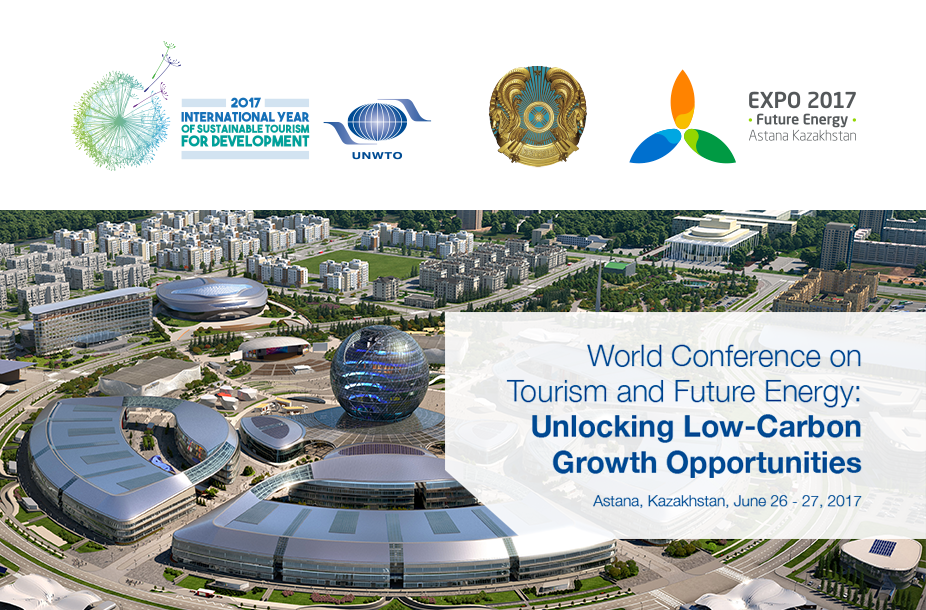
Tourism and future energy: committed to curb emissions
Under the title ‘Tourism and Future Energy: Unlocking low-carbon growth opportunities’, industry leaders and policy makers have convened in the Kazakh capital city of Astana to discuss the contribution of the tourism sector to reducing carbon emissions. The Conference is a joint initiative of Astana EXPO 2017 and the World Tourism Organization (UNWTO) with the support of the Ministry of Culture and Sports of Kazakhstan.
The event is held in the framework of the International Year of Sustainable Tourism for Development 2017 and aims to advance the commitment of the tourism sector to the global climate change agenda.
Discussions were focused on how to implement mitigation and adaptation measures in transport, accommodation and destinations in the scope of the Sustainable Development Goals – especially Goal 8 (Decent Work and Economic Growth), Goal 12 (Responsible Consumption and Production) and Goal 13 (Climate Action).
“One of the fastest-growing economic sectors nowadays, tourism represents 10% of the world’s GDP, 7% of global exports and 1 in every 10 jobs. But with growth comes responsibility as we work towards building a better future for a people and planet of prosperity and peace,” said UNWTO Secretary General Taleb Rifai.
“Tourism is estimated to account for 5% of global atmospheric CO2 emissions. We need to move towards a truly green tourism economy where growth is decoupled from environmental or cultural degradation”, he added.
“Tourism is a priority for Kazakhstan. Tourism is a driver of socio-economic development and we plan to increase the share of GDP from 1% to 8% by 2025,” said Askar Mamin, First Deputy Prime Minister of Kazakhstan, who requested UNWTO’s support to construct a sustainable tourism sector.
“The Prime Minister defined tourism as one of the pillars for the modernization of the national economy,” said Minister of Culture and Sports of Kazakhstan Arystanbek Mukhamediuly.
The Chairman of the Board of EXPO 2017, Akhmetzhan Yessimov, said: “The Expo is a unique opportunity to introduce Kazakhstan to the world and provide an impetus for comprehensive development of tourism”.
Curbing emissions, energy efficiency, the use of renewable energy and sustainable practices were underlined as key to ensure tourism’s contribution to the Paris Agreement. The Conference concluded on the need to:
1. Secure the commitment of all actors at national and local level (public and private sectors)
2. Develop policies and strategies at local level (cities and destinations)
3. Strengthen knowledge of how to change energy use patterns to generate investment opportunities
4. Move towards a green economy where growth is decoupled from the use of natural resources and creates green jobs
5. Fight climate change along the entire tourism value chain (transport to and within destinations, hospitality industries and activities)
6. Improve measurement for better management at global and local level
7. Adapt and act fast knowing there is no “one-fits-all” solution
8. Engage all stakeholders including local communities, staff and tourists and ensure the benefits of low-carbon growth are distributed to all
9. Build links with other sectors
10. Develop tourism products with low-carbon impact that can create jobs, especially for women and youth.
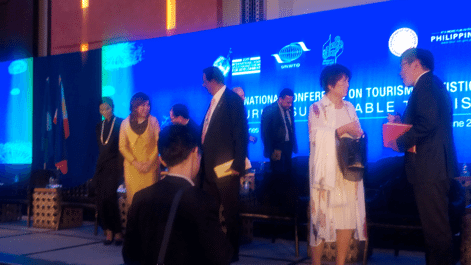
UNWTO Sustaining Tourism for Eliminating Poverty Foundation Chair: Keep stats simple
By Dean M. Bernardo, eTN Manila.
In the opening speech of the 6th UNWTO International Conference on Tourism Statistics being held from June 21-24, 2017 in Manila in the Philippines, Secretary General Taleb Rifai described the event as a purely technical meeting.
The conference aims to establish a standardized global framework on measuring tourism-related products and activities in any country, and aims for “capacity building” for sustainable development.
Tourism has become a significant contributor in the gross domestic product of most countries, accounting for nearly a third of the world’s trade output, thanks largely to nearly 1.235 billion travelers annually.
Ambassador Dho Young-shim of South Korea, and Chair of the UNWTO Sustaining Tourism for Eliminating Poverty Foundation, reminded delegates that keeping tabs on the economic performance of the tourism industry should best be kept simple and easily understood.
During the first open forum of the 3-day conference attended by almost 60 country delegates from all over the world, Ambassador Dho stressed that millions of people around the world depend on tourism as a livelihood.
Dho added that data generated from these statistics should equate to improving the lives of people and communities, while respecting and preserving the natural beauty of these destinations.
Since 1972 when the establishment of the UNESCO World Heritage Convention began, South Korea has over a dozen World Heritage sites and another dozen or more are awaiting recognition.
The country prides itself as being one of the premiere destinations in Asia as it preserves countless natural and man-made sites for the world to see and visit.
PHOTO: Ambassador Dho Young-shim of South Korea, and Chair of the UNWTO Sustaining Tourism for Eliminating Poverty Foundation (2nd from the right)
